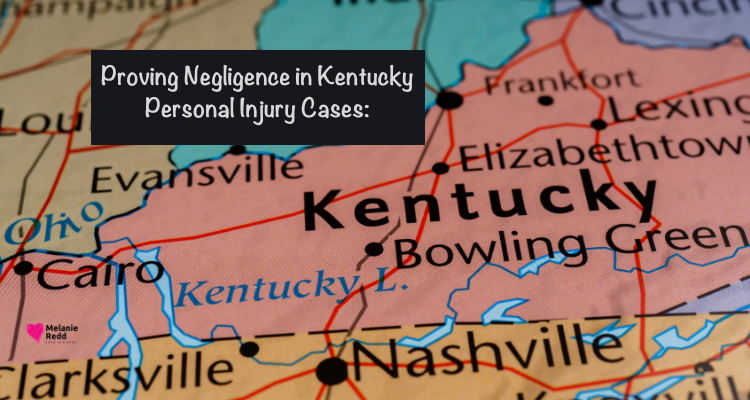Proving Negligence in Kentucky Personal Injury Cases

Proving Negligence in Kentucky Personal Injury Cases: Key Elements and Legal Insights
To begin with, negligence is critical in Kentucky personal injury cases. To win compensation, a plaintiff must prove the defendant had a duty, breached it, caused the injury, and resulted in damages. An injury attorney, Justin Peterson can guide victims through this process, ensuring all aspects of negligence are demonstrated in court.
Understanding the legal foundation of negligence in Kentucky can seem complicated, but breaking it down helps. Kentucky law demands that the plaintiff prove these elements by a preponderance of the evidence. This means showing that it’s more likely than not that the defendant’s actions caused the injury. Proper evidence and a good legal strategy make a significant difference.
Moreover, navigating a personal injury claim in Kentucky requires attention to detail and understanding the steps involved. Plaintiffs must gather medical records, document their injuries, and sometimes even hire expert witnesses. An experienced attorney can help simplify this journey and ensure all necessary steps are taken.
Key Takeaways
First… Proving negligence in Kentucky involves showing duty, breach, causation, and damages.
Second… Evidence must prove it’s more likely than not that the defendant caused the injury.
Third… Experienced legal help is vital to navigating the complex personal injury claims process.
Legal Foundations of Negligence in Kentucky
In Kentucky, proving negligence involves specific legal concepts. These include a duty of care, breach of duty, and establishing causation and damages. Understanding these principles is essential for navigating personal injury cases.
The Concept of Duty of Care
Indeed, the duty of care in Kentucky requires individuals to act with reasonable caution to avoid harming others. This duty exists in various situations, such as drivers on the road, doctors treating patients, or property owners maintaining safe premises.
In legal terms, the “reasonable person standard” is often used. This means that the behavior of the defendant is compared to what a hypothetical reasonable person would do in similar circumstances. If the defendant’s actions fall short, they may be found negligent.
Breach of Duty and Its Implications
Whereas, a breach of duty occurs when someone fails to meet their legal duty of care. In Kentucky, proving a breach of duty means showing that the defendant acted (or failed to act) in a way that a reasonable person would not.
For example, if a driver runs a red light and causes an accident, this is likely a breach of duty. The defendant’s actions must directly contradict their responsibility to prevent harm. Showing this breach is crucial in personal injury cases, as it connects the negligent behavior to the plaintiff’s injuries.
Establishing Causation and Damages
After proving a breach of duty, one must establish causation and damages. Causation involves demonstrating that the defendant’s breach directly caused the plaintiff’s injuries. This often requires showing both actual cause (but for; the defendant’s actions, the injury would not have occurred) and proximate cause (the injuries were a foreseeable result of the actions).
Even more, damages refer to the compensation sought for injuries. This can include medical expenses, lost wages, and pain and suffering. In Kentucky, comparing negligence may also be relevant, as the fault may be distributed among the involved parties, potentially reducing the compensation based on the plaintiff’s contribution to the incident.
Key Considerations for Plaintiffs
Therefore, plaintiffs in Kentucky personal injury cases need to understand the importance of presenting solid evidence, the impacts of comparative negligence, and the crucial role of a personal injury attorney. These elements can significantly influence the outcome of their injury claim.
Gathering and Presenting Evidence
A plaintiff must gather strong evidence to support their injury claim. This includes medical records, eyewitness accounts, photographs of the accident scene, and, if possible, surveillance footage.
Important Types of Evidence:
First – Medical Records: Document the extent and nature of injuries.
Second – Eyewitness Testimonies: Help establish the context of the accident.
Third – Accident Scene Photos: Provide visual proof of conditions.
Finally – Expert Witnesses: Can offer professional opinions on injury and negligence.
Also, having comprehensive evidence makes it easier to prove the defendant’s duty of care was breached, which is crucial under Kentucky Law.
Understanding Comparative Negligence
Kentucky follows the rule of comparative negligence, meaning the fault can be divided between the plaintiff and the defendant. The plaintiff’s recovery amount will be reduced by their percentage of fault. For example, if a plaintiff is found 20% at fault for the accident, their compensation will be reduced by 20%.
Key Points:
Fault is split between involved parties.
The plaintiff’s compensation is lowered by their fault percentage.
Both parties’ actions are scrutinized to determine fault.
Comparative negligence requires careful consideration, as any degree of fault attributed to the plaintiff diminishes their potential recovery.
Role of Personal Injury Attorney – Proving Negligence in Kentucky Personal Injury Cases
A personal injury attorney is vital for navigating a personal injury case. They help in gathering evidence, demonstrating negligence, and advocating on the plaintiff’s behalf. Their expertise ensures all legal angles are covered and proper procedures are followed.
Key Roles:
Advising: Providing legal advice and strategy.
Representing: Speaking and negotiating on the plaintiff’s behalf.
Documenting: Ensuring all paperwork and documentation are thorough and timely.
A good attorney helps the plaintiff feel supported throughout the legal process and increases the likelihood of a favorable outcome in their personal injury case.
Particulars of Personal Injury Claims in Kentucky
Personal injury claims in Kentucky involve various types of accidents, specific deadlines for filing, and different kinds of compensation. Each element is crucial for successfully pursuing a claim.
Types of Accidents and Injuries
Accidents that can lead to personal injury claims in Kentucky include car crashes, slips and falls, medical malpractice, and workplace injuries. Each type of accident may result in different kinds of injuries such as broken bones, head trauma, or soft tissue damage. It’s essential to document the accident and injuries thoroughly. Photos, medical records, and witness statements can help in proving the claim.
Statute of Limitations for Filing Claims
In Kentucky, the statute of limitations for personal injury claims is generally one year from the date of the accident or injury. This means that individuals must file their claim within this period or risk losing the right to seek compensation. There are some exceptions, such as cases involving minors, where the deadline may be extended. Consulting with an attorney can provide more specific guidance based on individual circumstances.
Compensation for Pain and Suffering
Pain and suffering compensation aims to cover the non-economic damages experienced by the injured party. These include physical pain, emotional distress, and loss of enjoyment of life. In Kentucky, there is no fixed formula for calculating these damages.
Factors considered often include the severity of the injury, the impact on daily life, and the duration of suffering. Testimonies from medical experts and personal accounts can be critical in substantiating these claims.
Calculating Lost Wages and Medical Expenses
Lost wages and medical expenses are critical components of a personal injury claim. Lost wages cover income lost due to the injury, including past and future earnings. Medical expenses include hospital bills, medication, rehabilitation, and any future medical care related to the injury.
To calculate these damages accurately, claimants should keep detailed records of all medical treatments and provide evidence of their income loss through pay stubs or employer statements. In some cases, expert testimony may be needed to project future loss. These elements are the foundation of a well-supported personal injury claim in Kentucky. Each aspect plays a vital role in ensuring that the injured party receives the compensation they deserve.
Steps in a Personal Injury Case
Filing the Lawsuit
The plaintiff files a complaint outlining the injury and alleged negligence. The court serves this to the defendant, who must respond within 20 days in Kentucky. Discovery follows, where both sides exchange information and evidence. Negotiations may occur to settle before trial.
The Trial Process
If the case goes to trial, both sides present evidence before a judge or jury. The plaintiff must prove duty of care, breach of duty, causation, and damages. Each party presents witnesses and exhibits. After deliberation, the judge or jury decides on liability and compensation. An experienced attorney is crucial throughout the process to ensure the best possible outcome for the plaintiff.
Were you encouraged by what you read?
Then, would you share this article with a friend, co-worker, or family member?
Or, maybe you can send it to a friend or family member?
This blog occasionally uses affiliate links and may contain affiliate links.
Additionally, Melanie Redd is a participant in the Amazon Services LLC Associates Program.
This is an affiliate advertising program designed to provide a means for sites to earn advertising fees. These are earned by advertising and linking to amazon.com.
Also, for more on my disclosure policy, click HERE.
© Melanie Redd and Hope Ministry, 2024. Unauthorized use and/or duplication of this material without express and written permission from this blog’s author and/or owner is strictly prohibited.
Further, excerpts and links may be used, provided that full and clear credit is given to Melanie Redd and Hope Ministry.
Please give appropriate and specific directions to the original content.




0 Comments